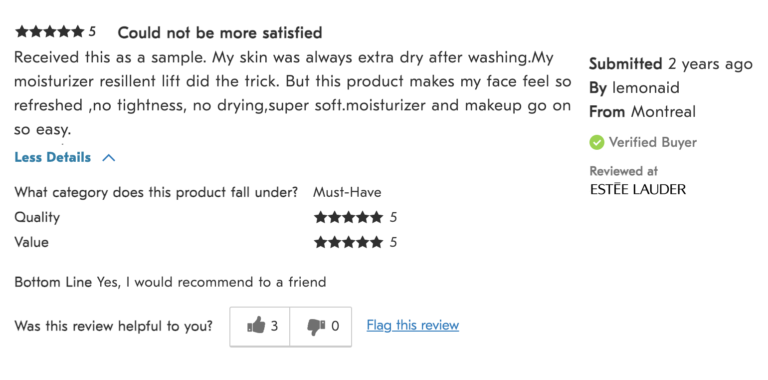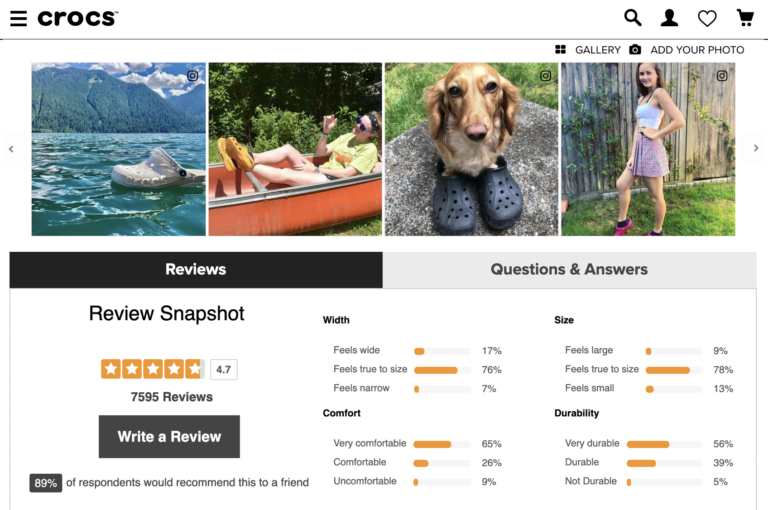Survey at a Glance:
The Growing Threat of Fake Reviews for Brands and Retailers in the UK is based on survey responses from 3,265 consumers in the UK from July 2022. Here’s a sneak peek of our key findings.
- When reading reviews, 90% of consumers in the UK are concerned about fake content.
- While they’re concerned about the entire ecommerce ecosystem, one site rises far above the others: Amazon. 83% are concerned with review reviews on Amazon.co.uk.
- 87% of consumers think they’ve read a fake review in the past.
- 67% of shoppers in the UK indicate that they’d be less likely to purchase a product if they found what they thought was a fake review.
- When browsing reviews, 71% of consumers consider how authentic the content is.
- 82% of UK shoppers regard reviews tagged with information about the source of said review as more authentic and real. Verified buyer and verified reviewer tags have a particularly favourable perception among shoppers.
- A mere 6% of shoppers believe that the ideal star rating for a product they’re considering is a perfect 5.0.
- The largest portion of shoppers – 45% – say that the ideal average star rating falls between 4.0 and 4.49.
Introduction
The vast majority of consumers rely on reviews to make informed purchase decisions – whether they’re shopping online, in-store, or some combination of the two. Consumers value this content because it’s honest, authentic and unbiased – for better or worse.
But there are threats to this authenticity: fake reviews and manufactured review presences (i.e. creating an artificially positive representation of the product by blocking negative reviews).
Recently, there have been plenty of news stories about rising concerns over fake reviews – and businesses that suppress negative content. In fact, governments are even stepping in to squelch this growing problem. The European Union (EU) Omnibus Directive 2019/2161, which came into effect in 2020, expands regulations to protect consumers – including stricter demands on fake and misleading reviews. And earlier this year, in the US, the Federal Trade Commision (FTC) fined clothing retailer Fashion Nova $4.2m for suppressing negative reviews.
It’s undoubtedly a global problem. But the fake and inauthentic reviews issue has perhaps garnered more attention in the UK than anywhere else.
Fake reviews – and suppressing negative content – misleads consumers. This leads to poor purchase decisions. It’s a short-term play that will catch up with the brand concerned before long. But that doesn’t mean it can’t be effective to driving sales before it does.
What’s more, the presence of fake reviews can tarnish a business’ hard earned reputation. And failing to publish negative content can cause consumers to lose trust in a brand or retailer.
Now, more than ever, brands and retailers must make it a priority to preserve the authenticity of reviews. But why? And how?
Recently, we surveyed more than 3,200 consumers in the UK to understand the importance to shoppers of review authenticity – and what can be done to preserve it. In this report, we share our key findings – as well as recommendations for brands and retailers looking to preserve consumer trust.
Who We Surveyed
This report is based on an analysis of a survey completed by 3,265 UK consumers during the month of July 2022. Here’s a snapshot of who we surveyed.
Generations
(1997-present)

(1981-1996)

(1965-1980)

(1946-1964)

Household Income
Monthly Online Spend
Growing Concern About Fake Reviews
These days, the majority of consumers consult reviews when shopping for just about anything. But for consumers in the UK, fake reviews are top of mind.
Most Consumers are Concerned with Fake Reviews
When reading product reviews from other customers, nine out of 10 shoppers in the UK indicate that they’re concerned with fake content. Notably, Gen Z shoppers are more likely to be concerned with fake reviews than older shoppers – but it’s still relatively consistent across the board.
But just how concerned are shoppers by fake reviews?
When asked to rank their concern on a scale of one to five (with one being least concerned and five being the most), the average response was 3.22. In fact, many consumers are quite concerned with fake reviews, with 89% ranking their concern as three or higher.
UK Consumers are Particularly Concerned with Fake Reviews on Amazon
When shopping online, consumers in the UK have a wide array of options. But are there certain sites for which consumers are particularly leery of fake reviews?
As it turns out, yes.
Amazon wins by a long shot. The largest portion of consumers – 83% – are concerned about fake reviews when shopping on Amazon.co.uk. Argos.co.uk is a distant second, with just over a quarter (26%) of UK shoppers feeling concerned about fake reviews there. Fake reviews are still a concern – but much less so – for other top online stores in the UK.
The Prevalence of Fake Reviews – and How Consumers Spot Them
The vast majority of consumers in the UK are concerned with fake reviews. But how prevalent is this content? And how do consumers spot it?
Most Consumers in the UK Have Spotted a Fake Review in the Wild
As it turns out, consumers are very familiar with fake reviews. Nearly nine in ten (87%) of consumers believe they’ve read a fake review in the past.
Interestingly, younger consumers are more likely to think they’ve read a fake review than older ones. Perhaps this is because younger shoppers are more adept at spotting the signs of a fake (more on that later) – or maybe they’re simply more cynical.
The likelihood of having read a fake review is also correlated with income. The higher the income, the more likely shoppers are to suspect they’ve read fake reviews.
But why? Most likely, because higher income consumers spend more online. Therefore, they read more reviews – and are more likely to encounter fakes.
How Shoppers Identify Fake Reviews
It seems fake reviews are quite prevalent, with most consumers in the UK suspecting they’ve run into them at least a time or two. But what is it that makest a shopper suspect a review is a fake?
The top red flag is the wording of the review. In other words, how it’s written. However, there are several other features that make shoppers think a review may be fake, including extremity and a lack of specific detail.
The Negative Impact of Fake Reviews
Consumers keep an eye out for fake reviews. And if they find one that looks fishy, they’re less likely to make a purchase.
Fake Reviews Deter Many Shoppers
Nearly seven in ten (67%) of shoppers say that if they found what they thought was a fake review, they wouldn’t buy the product in question.
Interestingly, Boomers are the generation most likely to pass up a product if they find a potentially fake review.
The Importance of Preserving Review Authenticity
Consumers consider many factors when reading reviews. One factor that rises to the top is review authenticity. Nearly three-quarters (71%) say that when reading reviews, they consider how authentic this content is.
And, as we’ve discussed earlier in this report, the presence of a review thought to be fake can send a shopper running in the other direction.
Clearly, brands and retailers must work to preserve the authenticity of reviews to preserve shoppers’ trust.
Transparency is Key
Reviews can originate from a number of sources. For example, a shopper might submit a review as the result of a post purchase email from the brand or retailer. In that case, the business knows the consumer is a verified buyer. Or, another shopper might have received a free sample of a product in exchange for a review.
One key way to boost shoppers’ trust in reviews is to disclose who wrote each one. The majority of shoppers – 82% – say they regard reviews tagged with information about the source as more authentic and real. Notably, such tags boost the confidence of younger shoppers slightly more than their older counterparts.

“Verified buyer” is the tag that has the biggest impact on shoppers’ perception of a given review. This makes sense, as readers can clearly see that the reviewer actually purchased the product in question.
Perfect Ratings Don’t Seem Real to Consumers
If there are only glowing reviews for a product, it can raise suspicions among shoppers. As we highlighted earlier in this report, a review being too extreme – whether positive or negative – raises suspicions among 55% of shoppers. What’s more, previous research found that 46% of shoppers are suspicious of products with a perfect average star rating of five out of five.
Our most recent research found that a mere 6% of consumers feel that 5.0 is the ideal average star rating for a product they’re considering. On the other hand, the largest portion of consumers – 45% – believe the ideal average star rating falls between 4.0 and 4.49.
While negative reviews aren’t something to aim for, the occasional negative review isn’t the end of the world. Negative reviews help shoppers determine the worst case scenario for a given product. Then, they can make the call if it’s something they can live with. What’s more, by displaying negative content, you’re letting shoppers know you have nothing to hide – and that you’re a business they can trust.
6 Key Takeaways for All Brands and Retailers
Reviews have become a key part of the purchase journey. Preserving the authenticity of this content must be a top priority for any business. Here are our five key takeaways from our latest survey.
We know from previous research that nearly all consumers read reviews when shopping online and over half (57%) do so when shopping in a brick-and-mortar shop. The presence of this content is proven to positively impact conversion.
However, fraudulent content is top of mind for shoppers, with 90% indicating they’re concerned about fake reviews. The shopping site they’re most concerned with fake reviews is Amazon.
The majority of shoppers (87%) believe they’ve read a fake review in the past. There are certain things that make them suspicious of a specific review, including wording, extremity, and lack of detail.
Your ratings and reviews provider should have a strong moderation process in place to identify potentially fraudulent reviews with these key red flags (among others). Be sure to ask.
The presence of even a single fake review can cause a shopper to rethink a purchase. Our research found that 67% of shoppers that found what they thought was a fake review wouldn’t purchase the product in question.
Once trust has been lost, it’s difficult (if not impossible) to restore. Brands and retailers must ensure fake reviews never make their way onto product pages.
Be sure your ratings and reviews provider – as well as your retail and marketplace partners – have strong measures in place to ensure fake reviews are identified – and never see the light of day.
Consumers value reviews because they are authentic. One key way to preserve that authenticity is to let shoppers know the source of reviews. 82% say that reviews tagged with information about who wrote it are more authentic and real.
Be sure to appropriately badge all reviews. For example, if a review was written by a verified buyer, indicate it in the review. And if a shopper received a free sample, disclose it. Providing information about the source of reviews will bolster shoppers’ trust – and help them make more informed purchase decisions.

Over half of shoppers (55%) are suspicious when a given review is too positive or too negative. And only 6% of shoppers feel that the ideal star rating for a product is 5.0.
If a product only has glowing reviews, it can raise suspicions that the brand or retailer is suppressing negative content. So while it’s important to moderate content for fraud and appropriateness, never suppress a review simply because it’s negative.
Consumers actively seek out negative reviews, and by displaying them, you’re empowering your shoppers to make more informed purchase decisions – while showing them you’re an honest company with nothing to hide.

While there are a lot of things you can do to promote authentic review content, fraudsters tend to be a determined bunch. If you struggle to identify fake reviews at the scale you need to, you might need to call in the experts. PowerReviews has robust fraud detection processes that combine human involvement with the best technology to power the most authentic review programs in the world.


